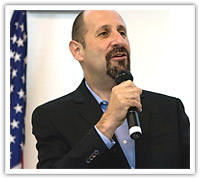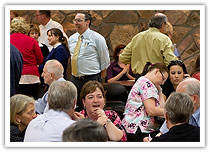As we begin meeting with local communities around the state about the new vision for the Oregon Health Plan, one strong theme is emerging: the time for this change is now.

Dr. Goldberg addresses meeting participants in Roseburg.
On Monday and Tuesday a total of about 250 people gathered in Roseburg and Medford to learn more about what the OHP transformation will mean for their local communities and how they can be leaders in guiding that change. Clients, providers, advocates, tribes, home health care workers, county representatives, and others came to learn and to engage in discussions about the proposed Coordinated Care Organizations. Joining me for the discussions in both locations was Mike Bonetto, the health policy advisor for Governor Kitzhaber and a member of the Oregon Health Policy Board. We also had Rep. Tim Freeman who joined in Roseburg and Sen. Alan Bates in Medford.
In both locations we also heard presentations from local health care partners who have already begun breaking down barriers and better coordinating care for OHP clients. They provided examples of what we need to build upon. Our job with the final proposal will be to ensure that it includes the flexibility to allow communities to innovate to meet the goals of better health, better care and lower costs. Attendees spoke about their hopes for a transformed health care system that will realign the dollars we spend in a way that will help meet those goals.

Participants in the OHP transformation community meeting in Roseburg.
In Medford, for example, an emergency medical technician pointed out that he does not get paid when he goes out on a call for Medicare clients unless he transports a patient to a health care facility, even if he is able to help them on the scene. That's an unnecessary cost that doesn't improve care. As we look at coordinating care for the 60,000 Oregonians who are served by both Medicare and Medicaid, we have to address this kind of wasted care so we can focus on care that helps people rather than meets the bureaucratic requirement of a billing code.
At the meetings we also discussed the patient's role in health improvement and how Coordinated Care Organizations should be set up to best meet the needs of local communities.
The input from these meetings will be gathered for the Oregon Health Policy Board for the final CCO proposal that will go to the Legislature later this year. For those not able to participate in person, we have a survey at www.health.oregon.gov. You can also go directly to the survey.
Next we will be headed to Pendleton, Florence and Bend. I'm looking forward to the discussions there to hear both the unique challenges and opportunities for those communities.
|